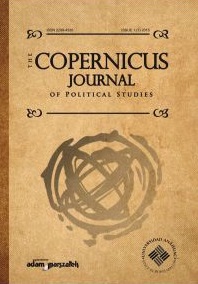Evolution of an Approach to the Problem of Relations which Public Authority May Enter, as a Condition for EU Membership
DOI:
https://doi.org/10.12775/18384Słowa kluczowe
Government, governance, European Union, hollow state, non-governmental actors, public authority, Westphaliantype stateAbstrakt
In the light of the evolution of political systems the classical model of national state does not have the potential to fully explain the complex of a state (public power) both current state and international relations. The new forms of governing the international markets and other economic processes, currently emerging, are engaging national governments. However, given a new role, the countries begin to function less as “sovereign” beings and more as components of international political community. At the same time occurs the engagement of non-governmental actors, employed to make important public decisions – it redefines society from being an object of governance to being a potential resource that needs to be activated in the pursuit of good public governance.
That is why, moving away from the centrally understood model of decision-making known from the nation-state determines understanding of modern relations that public authority takes part in (such as the membership in the structures of the European Union – which is connected to a change in conditions of established patterns of governing). To explain that phenomenon it is used the concept of a hollow state.
Full text: http://bazhum.muzhp.pl/czasopismo/589/?idno=14761
Bibliografia
Art. 294 Treaty on the Functioning of the European Union.
Brown Ch., From International to Global Justice? [in:] The Oxford Handbook of Political Theory, J.S. Dryzek, B. Honig, A. Phillips (eds.), New York 2006.
Bulmer S., Dolowitz D., Humphreys P., Padgett S., Policy Transfer in European Union Governance. Regulating the Utilities, London–New York 2007.
Bulmer S., Humphreys P. (University of Manchester), Paper for EUSA conference, Montreal 2007, http://aei.pitt.edu/7717/1/bulmer-s-04b.pdf [access: 15.06.2011].
Carrese P., The Cloaking of Power. Montesquiue, Blackstone and the Rise of Judical Activism, Chicago 2003.
Castells M., Siła tożsamości [The Power of Identity, Malden 2004], Warszawa 2008.
Dahendorf R., The Challenge for Democracy, “Journal of Democracy” 2003, No. 4, Vol. 14.
Encyclopedia of Governance, M. Bevir (ed.), Thousand Oaks–London–New Delhi 2007.
Gualini E., Reconnecting Space, Place, and Institutions: Inquiring into ‘Local’ Governance Capacity in Urban and Regional Research [in:] The Network Society. A New Context for Planning?, L. Albrechts, S.J. Mandelbaum (eds.), London 2005.
Heritier A., Lehmkuhl D., Introduction. The Shadow of Hierarchy and New Modes of Governance, “Journal of Public Policy” 2008, No. 1, Vol. 28.
Hirst P., Thompson G., Globalization In Question: The International Economy and the Possibilities of Governance, Cambridge 1996.
Kohler-Koch B., The Evolution and Transformation of European Governance [in:] B. Kohler-Koch, R. Eising, The Transformation of Governance in the European Union, London 1999.
Luhman N., The Differentiation of Society, New York 1982.
Miller J.G., Living Systems, New York 1978.
Morris Ch.W., Modern State [in:] Handbook of Political Theory, G.F. Gaus, Ch. Kukathas (eds.), London 2004.
Obywatele współdecydują. Przewodnik po partycypacji społecznej [Citizens Codecide. Guide to Social Participation], D. Długosz, J.J. Wygnański, M. Tański (eds.), Warszawa 2005.
Pikner T., Reorganizing Cross-Border Governance Capacity: The Case of the Helsinki-Tallinn Euregio, “European Urban and Regional Studies” 2008, No. 15.
Poggi G., The Development of the Modern State, London 1978.
Poggi G., The State: Its Nature, Development and Prospects, Oxford 1990.
Rhodes R.A.W., The Hollowing Out Of The State: The Changing Nature Of The Public Service In Britain, “The Political Quarterly” 1994, No. 2, Vol. 65.
Rhodes R.A.W., The New Governance: Governing without Government, “Political Studies” 1996, No. 4, Vol. 44.
Rhodes R.A.W., Understanding Governance. Policy Networks, Governance, Reflexivity and Accountability, Maidenhead 2008.
Sbargia A., From “Nation-state” to “Member-Sate”: The Evolution of the European Community [in:] Europe after Maastricht: American and European Perspective, P.M. Lützeler (ed.), Providence 1994.
Schmidt V.A., Democracy in Europe. The EU and National Polities, New York 2006.
Sørensen E., P. Triantafillou, The Politics of Self-Governance: An Introduction [in:] E. Sørensen, P. Triantafillou, The Politics of Self-Governance, Farnham-Burlington 2009.
Walby S., The Myth of the Nation-State: Theorizing Society and Polities in a Global Era, “Sociology” 2003, No. 3, Vol. 37.
Wprowadzenie do nauki o państwie i prawie [Introduction to the Study of State and Law], B. Szmulik, M. Żmigrodzki (eds.), Lublin 2007.
Zielonka J., Europa jako imperium. Nowe spojrzenie na Unię Europejską [Europe as Empire. A New Look at the European Union], Warszawa 2007.
Zielonka J., The Quality of Democracy after Joining the European Union Complex Governance Structure, “East European Politics and Societies” 2007, No. 1, Vol. 21.
Zürn M., Democratic Governance beyond the Nation-State: The EU and Other International Institutions, “European Journal of International Relations” 2000, No. 6.
Opublikowane
Jak cytować
Numer
Dział
Statystyki
Liczba wyświetleń i pobrań: 0
Liczba cytowań: 0



